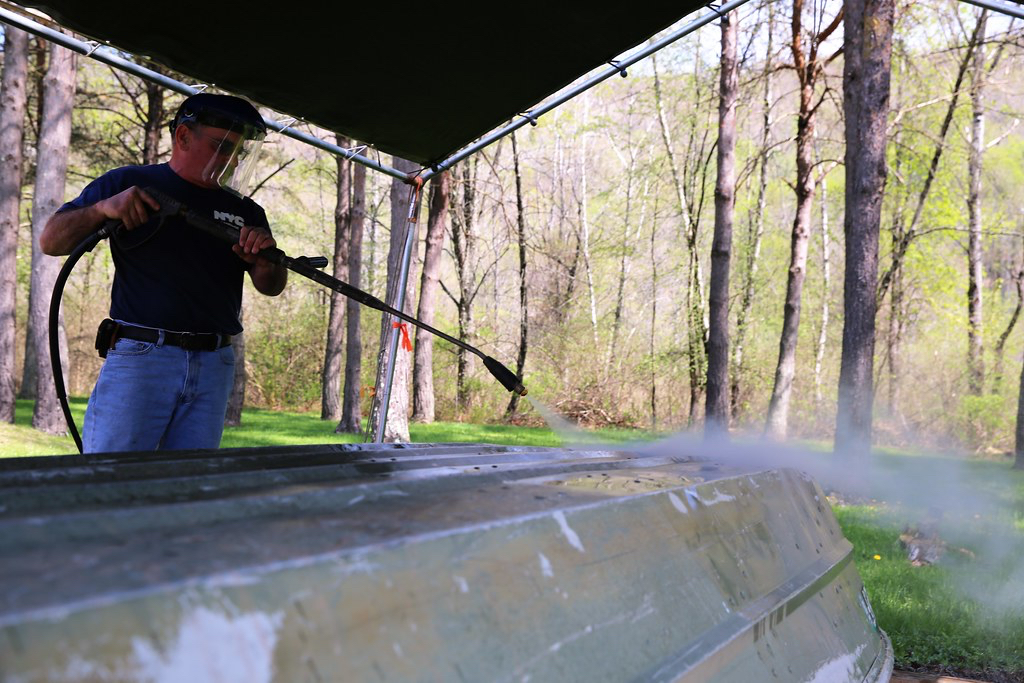DEP to Begin Phased Re-opening of Boating Programs and Steam-Cleaning Services
May 21, 2020
Restart of recreational boating and stream cleaning for fishing boats will follow New York’s regional plan for re-opening businesses
The New York City Department of Environmental Protection (DEP) today outlined a phased plan to reopen its boat offices throughout the watershed, and start the recreational boating season at select reservoirs in the Catskills. The opening of boat offices and the recreational boating program was delayed by several weeks this spring because of the COVID-19 pandemic. Both will open at select locations starting next week, in accordance with regional re-opening plans designated by the State of New York.
The reservoirs that allow boating are located in four of the state’s designated regions, including the Mid-Hudson, Capital Region, Southern Tier, and Mohawk Valley regions. At this time all those areas except the Mid-Hudson Region have achieved the state-designated metrics to start re-opening businesses. The state noted that “low-risk recreation” could begin in these areas.
The use of boats on New York City’s reservoirs is split between two programs. The first program allows the use of rowboats for fishing on all 19 of the city’s water-supply reservoirs. Each rowboat must be registered and steam-cleaned at a DEP boat office. Boat offices in Downsville and Gilboa will begin accepting appointments by phone on Tuesday, May 26 to steam clean boats that will be used and stored at Cannonsville, Pepacton or Schoharie reservoirs. Those offices will not clean boats to be used and stored at other reservoirs. Boat offices in Grahamsville, Ashokan and Mahopac will remain closed pending the re-opening of the Mid-Hudson Region. Anglers must call the boat offices ahead of time to schedule an appointment. The boat office in Downsville can be reached at (607) 363-7009; Gilboa can be reached at (607) 588-6231.
Those anglers with a valid boat tag and a rowboat already stored alongside the reservoirs may continue to use them. The reservoirs are also open to shoreline fishing for anyone with a state fishing license and a free DEP Access Permit.
The second program allows the use of recreational boats—kayaks and canoes—at Cannonsville, Neversink, Pepacton and Schoharie reservoirs. To protect water quality in these reservoirs, the recreational boating program relies on a small network of trained businesses that stream clean the boats before they are used each spring. DEP will perform the annual inspection of steam-cleaning equipment at these local businesses in the coming days, and allow them to begin cleaning recreational boats on Friday, May 29. Businesses that provide pre-cleaned rental boats at the reservoirs will also be permitted to start rentals on that day. The program will begin with recreational boating at Cannonsville, Pepacton and Schoharie reservoirs only. Neversink Reservoir will open for recreational boating once the Mid-Hudson Region meets the state criteria. A complete list of steam-cleaning businesses and rental vendors can be found on the Catskill Watershed Corporation website.
DEP also reminds anglers and boaters to follow guidance from federal, state and local health authorities. Those who use the reservoirs should continue to maintain a physical distance from others, vigorously wash their hands or use hand sanitizer, and wear face coverings if they anticipate coming into close contact with others.
DEP manages New York City’s water supply, providing more than 1 billion gallons of high-quality water each day to more than 9.6 million New Yorkers. This includes more than 70 upstate communities and institutions in Ulster, Orange, Putnam and Westchester counties who consume an average of 110 million total gallons of drinking water daily from New York City’s water supply system. This water comes from the Catskill, Delaware, and Croton watersheds that extend more than 125 miles from the City, and the system comprises 19 reservoirs, three controlled lakes, and numerous tunnels and aqueducts. DEP has nearly 6,000 employees, including almost 1,000 scientists, engineers, surveyors, watershed maintainers and other professionals in the watershed. In addition to its $70 million payroll and $168.9 million in annual taxes paid in upstate counties, DEP has invested more than $1.7 billion in watershed protection programs—including partnership organizations such as the Catskill Watershed Corporation and the Watershed Agricultural Council—that support sustainable farming practices, environmentally sensitive economic development, and local economic opportunity. In addition, DEP has a robust capital program with $20.1 billion in investments planned over the next decade that will create up to 3,000 construction-related jobs per year. For more information, visit nyc.gov/dep, like us on Facebook, or follow us on Twitter.





